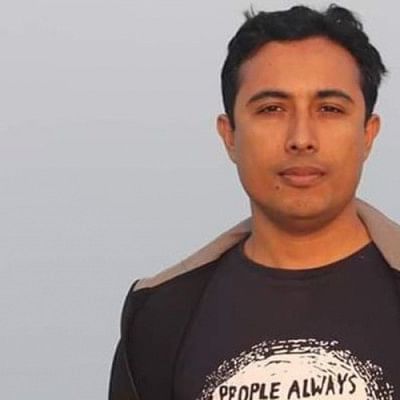How much power is too much?

By now, we have all heard of the harrowing story of Bangla Tribune correspondent Ariful Islam, who was beaten, blindfolded and dragged from his home in the middle of the night in Kurigram on March 14. He later recounted how he begged for mercy, telling his abductors—Senior Assistant Commissioner (RDC) Nazim Uddin, two magistrates as well as police and Ansar men—that he had children in the house. He was taken to the DC office, where he was once again beaten, only this time he was stripped and filmed. All of this was part of the "operations" of a mobile court, which then sentenced him to one year in prison on charges of "possessing" drugs.
By now, it has also become clear that Ariful's criticism of the Kurigram Deputy Commissioner (DC) Sultana Pervin, which included her intention to name a government pond after herself, had something to do with this "operation". A writ petition has been filed with the High Court, asking for the conviction to be declared illegal. The DC, RDC and the two magistrates have all been withdrawn from their duties, and it has been more or less roundly acknowledged that what happened to Ariful was a gross misuse of power and an attempt to choke press freedom and prevent a journalist from reporting on local corruption.
However, we must also acknowledge that all this was made possible because Ariful is a member of the press, and the persons involved have all been withdrawn after wide media coverage. But the media is fickle, and once we have moved on to the next topic (e.g. the pandemic that is about to hit us like a ton of bricks has already taken up most of the spotlight), what will happen next?
The case against Ariful is rife with irregularities. A mobile court only has the authority to sentence a crime, not to knock your door down at midnight and drag you to the police station to be tortured—that is usually the remit of our law enforcement authorities. It also needs to go through a number of protocols for such a raid to be authorised, but to this date, no one seems to be able to say who exactly was in charge of it. According to news reports, Abu Zafar, assistant director of the Department of Narcotics Control's Kurigram office, said he was busy in Lalmonirhat and did not authorise any raid. Reports also quoted another source from within the department, who confirmed that the raid was organised by the district administration; however, no letter was given from the DC office, in accordance with the procedure that is meant to be followed when organising a mobile team or taskforce. Kurigram municipality mayor Abdul Jalil also told reporters that permission was not taken from the mayor to organise this mobile team, and called it an "illegal raid".
Even if a mobile court has the authority to break down someone's door and drag them away—which it doesn't—it is clear that granting such judicial powers to deputy commissioners makes it frighteningly easy for them to abuse that. It effectively allows them to create a parallel judiciary and crown themselves judge, jury and executioner of the person on trial, with no outside authority to hold them to account—something that is in direct conflict with our constitution, which provides for the separation of powers. This was made clear in May 2017, when the High Court issued a 62-page ruling that said the running of mobile courts by executive and district magistrates is "a frontal attack on the independence of the judiciary and is violative of the theory of separation of powers". However, this ruling is still stuck in the Appellate Division, and many legal experts have argued that mobile courts do have their benefits, especially when it comes to providing speedy justice for those with little access to the judicial system.
What they are most definitely not meant to do is terrorise the people who need them the most. In Ariful's own words, "I thought they were taking me somewhere to kill me. I broke down in tears." They told him, "You will be put in a crossfire. Your time is up. Recite the kalima."
The fear that gripped him in this moment is not surprising, given how common extrajudicial killings have become in Bangladesh. But Ariful's case doesn't just show us the very real fear of crossfire, but also the equally real fear of being picked up in the middle of the night and unlawfully detained and sentenced. The fact that Ariful was a journalist, picked up for doing his job, has brought him a lot of attention and opened up the door to a safe return to his family. Others have not been so lucky.
Even in this particular case, the man directly involved with assaulting Ariful has quite the reputation for abusing power. This was not the first time he had decided to take the law into his own hands. Dhaka Tribune reported on how he terrorised two local fishermen, Bishwanath Nama Das and Khalequzzaman Maznu, and sentenced them to 11 months in jail last month on behalf of DC Sultana Pervin. Again, when investigated further, it was found that the local police had no knowledge of a mobile court drive that night. Maznu told reporters that Nazim Uddin also picked him up in the middle of the night and threatened him, before demanding Tk 200,000. Bishwanath's wife, at a press conference in Kurigram, said not only was her husband assaulted, but Nazim kicked her and their children as well. Their crime? Filing a writ at the High Court regarding their use of a local beel for their livelihoods, which was being blocked by the DC's office. The two fishermen, who are uneducated and live from day to day, are not even aware of what crime they have been charged with. Their stories of unlawful arrest and imprisonment didn't quite capture the media's attention in the same way. Yet maybe these are the people who needed it the most.
Before he was posted to Kurigram, Nazim Uddin was stand-released from his duties as Land Commissioner of Cox's Bazar Sadar upazila for similar acts of corruption and violence. One video that went viral on social media shows him physically assaulting an elderly man named Naku Majhi. This begs the question: why was Nazim never punished but instead simply transferred to another office? Why, even after his withdrawal, did he have the audacity to pick up Bishwanath on March 17 and threaten him once again with "crossfire"? Why did DC Pervin, even after being withdrawn, have the audacity to call Ariful and make light of a night where he was tortured, humiliated and put in fear of his life, and assure him that she will withdraw the case and that he should "let the matter go" and "look at it positively?"
The answer is simple. It's something that we have been discussing, without really going anywhere with it, for a long time—the culture of impunity that allows the growing misuse and abuse of power and is rotting our governance system from within. We cannot continue to have a system where the law applies to some but not to others. The sanctity of the judiciary and the legal process is something we must all uphold. Even the most hardened cynic, who believes a certain level of corruption and abuse of power is part and parcel of a South Asian democracy, can understand that once the judiciary loses its power to punish the criminal, the executive also loses its power to implement law and order. It is one thing to struggle to hold to account those with massive levels of wealth and influence in their hands, but it is really quite another thing to "punish" corrupt and violent government officials simply by making them OSD (Officers on Special Duty), which blocks their promotions but allows them to continue to draw salaries paid for by taxpayer money.
Is there really any excuse to not hold to account the people who, in the larger scale of things, engage in such "small" crimes but, in a way, end up doing the most terrible harm (since their abuse of power hurts those who do not have the power to speak out against injustice)? How many more fishermen from villages will have to be harassed and locked up by the Nazims of our system until they, too, can hope for some justice?
Shuprova Tasneem is a member of the editorial team at The Daily Star.
Her Twitter handle is @ShuprovaTasneem.

 For all latest news, follow The Daily Star's Google News channel.
For all latest news, follow The Daily Star's Google News channel. 



Comments